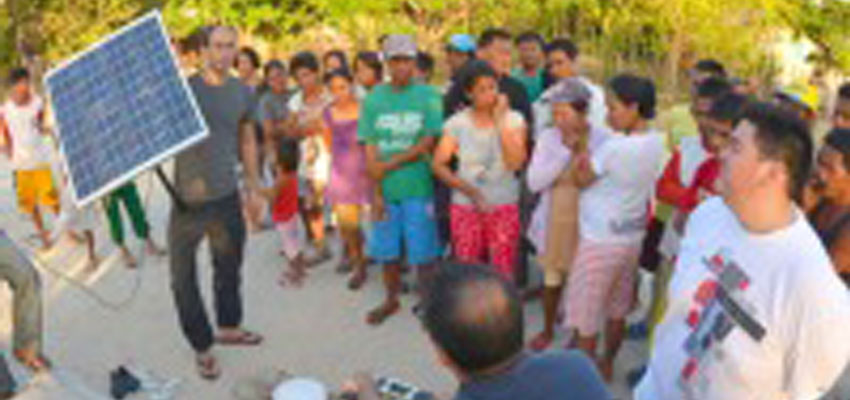
I’m standing on a basketball court on Alibijaban Island in the Philippines, explaining to a crowd how we can install solar panels on their homes. A lot of the people in the audience have machetes, and this is my debut performance of an unpolished script. They're smiling, though. I hope that counts for something.
My company, tinyPipes, is a solar utility company for unelectrified homes. We install solar panels that act like pre-paid cell phones for energy. Users buy "load" on a panel by making a payment via mobile phone or at a local store, and the panel gets a signal over the cellular network to unlock for a certain amount of time to deliver energy to the user.
This is my first time talking to a group in Tagalog. The machetes are sticking in my mind. On the island, carrying a machete is about as controversial as carrying a nail clipper, but it’s really unnerving to talk to a crowd of people with huge knives. I take a breath and start, “I’m not here to sell you anything.”
Everything we do is about distributability -- our panels are simple, cheap and compact, and we can electrify homes anywhere there's cell signal and sunlight. This makes us a really fast and cheap way to electrify places that are hard for a traditional grid to reach. And this is why I'm standing in a basketball court on Pulo Dos in Alibijaban Island in the Philippines, explaining to a crowd how they could use the system in their homes.
But it's not enough to have panels that can power unelectrified homes. We need to find those homes, sign them up, and put panels on their roofs. The first thing we did was very simple: we walked around to homes and talked to them. That worked pretty well, and we were able to sign up homes, but it took a lot of effort to sign up one house, making it hard to scale up.
I’m walking up and down the basketball court while I talk. There’s a good amount of people, probably fifty or sixty folks standing around and watching. I look through the crowd while I talk, making eye contact and trying to gauge what they’re thinking—are they interested? Skeptical? Bored? The emotions run the gamut.
This time, we're going one level up: we have been able to get the word out to barangay (village) captains in a couple off-grid areas that we are electrifying. These local leaders organized a town hall-style meeting for us with interested people in the area. We're doing demos in three barangays, with a combined population of about a thousand homes. The goal is to find early adopters in the barangays, about one hundred households, who want to try out our panels, and set up a way for others to sign up on their own by texting us or signing up at a local sari-sari (variety) store – another experiment in off-grid marketing that we hope will help us reach many more people.
Gradually, the ice melts, and people start shouting out questions, asking for more specifics about how they could use the system in their homes. Hannah and Friday start circulating with a sign-up sheet, having short one-on-one conversations and taking names from interested people. The crowd is interested now, and we’ve covered all the main points, so the meeting breaks down into small groups, and my partners and I walk around, talking with each of the groups and popping out to look over the roofs and electronics in people’s homes. Everyone’s all smiles.
We built a demo over the past month to turn the abstract concept of charging a battery into something tangible and interactive that we could show to a crowd. I tag-team the demo with Skip, one of my Filipino partners. We're ad-libbing our way through this first demo, but afterwards, we'll pick apart the audience reaction to every sentence we deliver, suggest changes to each-others' lines and style, and go through a video of our demo, tweaking our delivery for the next time. Hannah and Friday, a couple of our volunteers, walk through the crowd with sign-up sheets, taking names. Half an hour later, we've got 30 sign-ups, a good start for a new barangay. We hang out and talk with folks for a while, visit a couple houses to answer some questions about their electricity setup, and then we're catching a banka boat to the next barangay. A good day on the island.




